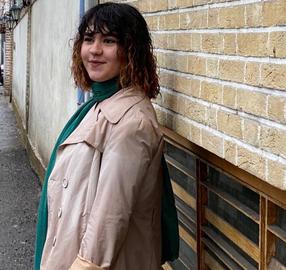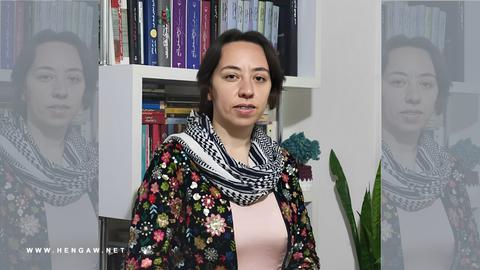An Iranian citizen journalist, who writes under a pseudonym to protect her identity, wrote the following article on the ground inside Iran.
It all begins with a simple photograph on social media, an image that very quickly goes viral. It’s a photo of yet another actor or director who is fleeing in Iran to pursue their dreams and a better life abroad, to escape to a place that promotes creative freedom and where theater and film professionals are assured they can work without interference.
This mass exodus of movie and television stars and directors is, sadly, nothing new, dating back to the birth of the Islamic Republic itself. Recently, it has become a hot topic again, mainly because of social media and greater amounts of information being shared online. In fact, the free flow of information has in turn greatly accelerated the number of actors and directors leaving Iran, to the extent that it has become a considerable problem for the national broadcaster, Islamic Republic of Iran Broadcasting (IRIB), and for the Ministry of Culture and Islamic Guidance.
Over the past few months, this wave of emigration has begun to worry officials, who refuse to accept that they are in any way responsible for it. But it is they who — rather than identifying the problem and solving it — have caused this war. Authorities clamp down on artists, and pick and choose who can and cannot appear on television. They issue strange and baffling directives and make unreasonable demands on artists. They block many actors from appearing on Iranian state-run television.
Iranian female actors are very much on the frontline of this battle. Shortly after the Islamic Revolution of 1979, wearing the hijab became compulsory, and strict Islamic dress codes were enforced. This continues to affect women actors in Iran today. If they dare to do something controversial, such as reveal a strand of hair, post pictures of their private lives online or express an opinion, they are forced to answer to the courts or hardline media. It is therefore no wonder that some of these women have rebelled against the state-imposed hijab and the way they have been treated, and many have chosen to go abroad.
Numerous male directors and actors have joined their female counterparts in their protests against Iran’s restrictive cultural environment. Here, IranWire highlights the female actors who have made a stand, refusing to put up with the situation any longer. These women fall into two categories: those who left Iran when they were already famous and those who became famous once they left.
Zahra Amir Ebrahimi: Forced out by a Scandal

Before leaving Iran, Zahra Amir Ebrahimi worked as a photographer, television actor and director of short films. She made her first short film when she was just 18 years old, and her career showed great promise. But, in 2006, a sex video allegedly featuring Ebrahimi was posted online, signaling a dramatic change for her future. Copies of the video were sold on street corners, the police interrogated Ebrahimi, and the media slated her, referring to the scandal as unforgiveable. She repeatedly denied that she was the woman featured in the video.
In an interview with the British newspaper the Guardian, Ebrahimi dismissed the video as being a fake produced by her bitter former fiancé, who had made a montage of incriminating images designed to destroy her career. “I watched the film after I heard about the fuss from colleagues. The girl in it isn’t me,” Ebrahimi said.
At the time of the scandal, she was starring in Narges, a very popular television series commanding a huge audience — one source said that around 68 percent of Iranians tuned into the series.
Although the courts did not prosecute Ebrahimi for the high profile scandal, she felt that her career had suffered irreparable damage and she shortly left Iran to live and work in France.
Since moving to France, she has appeared on stage in Paris alongside numerous influential actors, including Iranian actress and playwright Shabnam Tolouei.
Golshifteh Farahani:

When Golshifteh Farahani accepted an offer by director Ridley Scott to appear in his 2008 film Body of Lies, Farahani could never have imagined how drastically her career would change — appearing in just a few, short scenes with Leonardo DiCaprio made all the difference. Despite the fact that when Farahani signed her contract, she made sure to do so on the condition that she wore the Islamic hijab, hardliners — who were in charge of the Ministry of Culture and Islamic Guidance at the time — remained unappeased.
Golshifteh Farahani was the fourth person in her family to become an actor. At the age of 14, she played the leading role in Dariush Mehrjui’s 1999 film Pear Tree, a performance that made her the youngest winner of the Best Actress Award at the 16th Fajr International Film Festival in Tehran.
Before Body of Lies, Farahani acted in a total of 20 Iranian films. She also appeared in About Elly, a film by Asghar Farhadi, who has so far been the only Iranian director to win an Oscar. Farahani was also the favorite to win a second Best Actress Award at the Fajr International Film Festival, but festival organizers disqualified her because she had appeared at the New York premiere of Body of Lies not wearing a headscarf. As a result, authorities nearly banned About Elly from being shown in Iran, though it was eventually shown.
This was just the beginning of Farahani’s problems.
Security Agents from both the Ministry of Culture and Islamic Guidance and the Intelligence Ministry summoned her, and informed her that she was banned from acting and that her passport had been confiscated.
In the run-up to the 2009 presidential election, Farahani escaped to Paris, where she later spoke publicly in favor of the Green Movement. As a result, she was told she would never been welcome in Iran.
In 2012, Farahani posed nude for French magazine Madame Figaro.
She also appeared in a short black-and-white promotional video with 30 other young French cinema "hopefuls" to promote the Césars, the so-called “French Oscars”, where she was nominated for her role in the winsome immigrant comedy If You Die, I'll Kill You. The short film showed each of the actors involved taking off an item of clothing as they looked directly into the camera. Farahani chose to bare her right breast, and said: "I will put flesh to your dreams."
Iranian officials responded immediately, sending an agent to visit Farahani’s parents at their apartment in Tehran. According to the Guardian, the agent said he was from the Supreme Court of the Islamic Republic. “He began shouting at her father,” the newspaper reported, “telling him that his daughter would be punished and that her breasts would be cut off and presented to him on a platter.”
Farahani was shaken by the news. "It was a big shock for me and my family and for the whole of Iranian society,” she told the Guardian. “The good thing is that it started a huge debate, which could never have happened before. I was there watching people insult me, others answering them, others defending me, others attacking again.”
But Farahani also acknowledged the dangers of her predicament. "I should be careful because I know they [her parents] are being held hostage,” said Farahani. “But then after a while, because of the background of my father – who dragged himself up from very humble origins – their feelings began to change. My father was afraid I’d lost the support of the people, which is very important to him, because he’s spent his whole life battling for the people, sacrificing everything. But after a month or two he saw the people had more respect for me, and he became very happy.”
Farahani has spoken about how much she appreciates living outside the Islamic Republic. "For the first time in my life I appreciated being a woman,” she said. “Paris is a city that liberates you as a woman from all your sins that you think you’re guilty of, it washes away all of that and you are free."
Zohreh Rahmat, Citizen Journalist, Tabriz
Related articles:
visit the accountability section
In this section of Iran Wire, you can contact the officials and launch your campaign for various problems
























comments